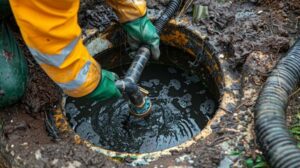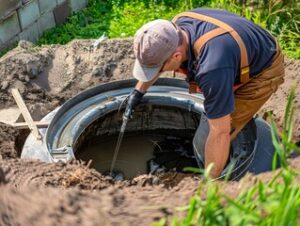Septic Tank Cleaning Perth is an important preventative service that saves you a lot of money in the long run. Keeping up with your septic system ensures that wastewater is properly disposed of and won’t end up clogging your drainpipes or contaminating the surrounding environment.

A septic tank is a buried, water-tight container that holds waste. Solids settle to the bottom, forming a sludge layer, and liquid waste (effluent) floats to the top.
A clogged drain or toilet is one of the most obvious signs that your septic system is in need of cleaning. It is also a major health risk that can cause bacterial infections. The toxins from a clogged tank will make their way into your home and into your water supply. This is a dangerous situation for you and your family. Regular septic tank cleaning helps to prevent these issues from occurring.
Your septic tank is a large, underground, water-tight container made of concrete, fiberglass, or polyethylene. Its job is to hold wastewater long enough for solid wastes to settle at the bottom and form sludge, while oil and grease float to the top and become scum. A T-shaped outlet and compartments allow the liquid wastewater (effluent) to exit the septic tank into the drainfield area. Regular septic tank cleaning ensures that this process occurs correctly and efficiently.
If you aren’t getting your septic tank cleaned, the solid waste will build up and eventually overflow from your septic system. This overflow will likely be into your drainfield and leach field, where it can block the flow of sewage and cause a backed-up system. This can be very messy and expensive to fix.
Another common sign that your septic tank needs cleaning is foul waste smells. This unpleasant odor is caused by hydrogen sulfide gasses produced by the decomposition of solid waste in your septic system. These gasses can seep into your house and make their way through your drains and into the air, causing a strong odor that can be hard to get rid of.
A septic tank cleaner will use a truck equipped with a large hose to enter the septic tank. They will place the hose in the access port for both compartments and use a mechanical arm to agitate the contents of the tank, breaking up sludge and scum. The hose is then used to suck the sludge and scum into a tanker truck for disposal at an offsite location. The cleaner may also use fresh water to flush the septic tank afterward.
Unpleasant Smells
If you notice unpleasant odors coming from your home’s drains or toilets, it’s time for a septic tank inspection and cleaning. Odors from a septic system often indicate that it is overflowing or that sewage is back-washing into the house.
When a septic system is working properly, it will be free of odors. Odors are caused by a combination of things including clogs and overflows, which can be addressed by regular maintenance and a professional cleanout.
Unpleasant odors can also indicate that the septic tank is leaking into the groundwater supply, which can be a serious health hazard. If you don’t have a proper septic tank cleaning plan in place, your family could be exposed to toxic fumes that can cause respiratory problems and even bacterial infections.
A septic tank is filled with bacteria inside, which will break down organic waste solids and liquid into three layers: sludge, scum, and effluent. If the pH level of the septic tank becomes too acidic, it can disrupt the microbes and cause a foul odor. To prevent this, you should avoid flushing non-organic waste such as cigarette butts, coffee grounds, and cleaning products down your toilets.
In some cases, septic tank odors can be a sign of a leak from the manhole or a broken vent pipe. You can help to minimize this by adding a carbon filter to the top of your plumbing vent to trap septic gases. It’s also a good idea to have your vent pipes extended if you live in a low-lying or valley area, as this will help the wind disperse these odors better.
Another possible culprit for unpleasant septic tank odors is an animal infestation. Birds, squirrels, and other small rodents often build their nests in septic vent pipes to stay warm during the winter. These odors are particularly strong in cold weather and can permeate your indoor space. If this happens, you will need to call a local wildlife removal service to come out and remove the animal’s nest, as well as install new vent pipes.
Overflowing Water
Septic tank cleaning is something most homeowners don’t think about until they need to call a plumber in the middle of the night because sewage is backing up into their home. A septic system is an integral part of any residential property, and it’s crucial to keep it clean to avoid serious problems that can put your family’s health at risk.
A septic tank is a concrete container that holds all the wastewater from your drains until bacteria inside it breaks down the waste. The waste will then separate into three layers: a sludge layer, a floating scum layer and an effluent layer. The sludge layer and the scum layer are solid waste that will need to be pumped out, while the effluent is the liquid wastewater that will be deposited into the drain field.
When your septic system is working properly, it will allow the liquid wastewater to flow into the drain field and soak into the soil, where microbes, sand and coarse gravel help to break down and filter any remaining pathogenic materials. A properly functioning septic system will also prevent clogs in the pipes that lead from your house to the septic tank and drain field.
If your septic system isn’t being cleaned properly, the solid matter from the sludge and scum layers will remain in the tank and can leak into the surrounding groundwater, polluting local water sources. This is a major threat to the environment and the community, as it can carry harmful bacteria and other contaminants into local water bodies.
One of the main signs that your septic tank is overflowing is if the liquid in the septic tank is above the bottom of the outlet tee or the top of the floating scum layer. The best way to prevent this is to have your septic tank pumped regularly.
Most septic tanks need to be cleaned every three to five years, although some will require more frequent pumping. The number of people living in your household and the amount of water used will play a big role in how often you need your septic tank cleaned. For example, a four-bedroom home will need a larger septic tank than a one-bedroom home, and households with children usually use more water and put more solid waste into the system than households without children.
Failing Inspections
If you find yourself unable to use any of your drains, it could be because the wastewater from your home is backflowing into the sewer system. This is one of the most severe and dangerous signs of septic tank problems and requires immediate attention.
A professional will be able to help you get the problem under control quickly before it gets out of hand. They can also clean out your drainpipes to prevent future clogs and reduce the risk of sewage leaks into your home.
During septic tank cleaning, the professionals will use powerful equipment to break down all solids in your tank, creating three layers. The bottom layer is sludge, which is comprised of inorganic solid waste materials. The middle layer is scum, which contains organic solids and wastewater. The top layer is effluent, which is treated sewage. Once the septic tank is clean, it will be ready to be used again in your home.
Regular septic tank inspections can also help you avoid more expensive repairs in the future. The inspector will be able to see how full your tank is and determine when you need it cleaned. The inspection will also reveal the condition of your drain field, which is where the treated wastewater is dispersed into the ground. A failed drain field can cause septic tank backups and pollute groundwater.
The costs of septic tank pumping and cleaning are significantly less than the cost of repairing or replacing a failing septic system. In addition, routine maintenance helps to reduce septic tank failures and environmental pollution, which can endanger nearby wildlife and the surrounding environment.
Septic tanks can be intimidating, but cleaning them doesn’t have to be. Just keep an eye out for the warning signs and have your septic tank cleaned regularly to avoid expensive problems. For more information about how often you should have your septic tank pumped, talk to a local septic service provider. They can give you a more accurate estimate based on your tank size and the complexity of the system. They can also provide you with tips for extending the life of your septic tank.
